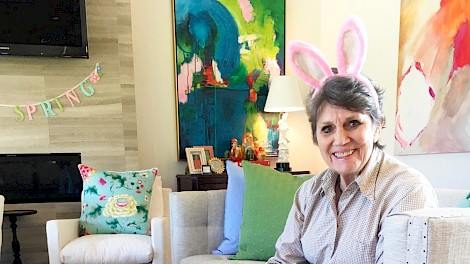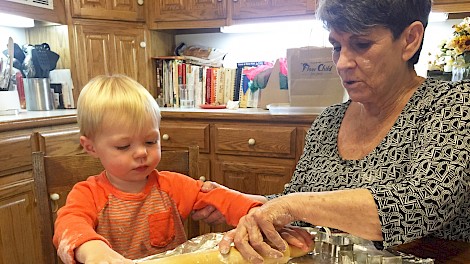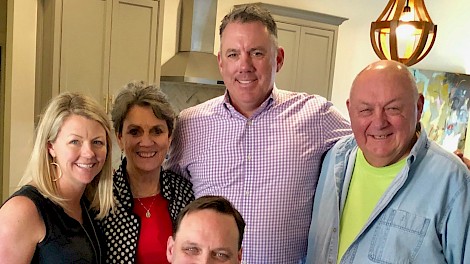Here and Now

Amanda Horton shares her Alzheimer's caregiving story.
Even though she is still with us, I have filled buckets of tears over the past eight years grieving the gradual loss of my mother. From the initial thoughts of “Mom seems pretty forgetful lately” to the gut-wrenching realization of dealing with full-blown dementia and Alzheimer’s, I would not wish the peaks and valleys of this experience on anyone.
But I have finally stopped feeling sorry for myself.
I am a firm believer that your mindset influences every aspect of your life. Beyond taking care of my mother, I am also caring for my own children. Though waves of grief sometimes seem to flood over me, and I know I must acknowledge those feelings, I must also be able to pivot and change my perspective and then move on.
During the beginning of Mom’s illness, she would repeatedly tell Jason and me how much she loved us and how proud we made her. We would smile, thank her, and give her a hug. After the 100th time she said it, we would giggle a little. She must have known she was repeating herself. Jason would always say, “At least she likes us, and she is kind-hearted. It would be awful if she told us she hated us or cussed at us 100 times a day.” We had no choice but to laugh, grit our teeth, and roll with it.
Before the pandemic, I would visit with all the residents of the memory care center when I would visit Mom. There is something about hanging out with the residents with Alzheimer’s that seems to make life come to a screeching halt. They can’t remember most of the past, or sometimes even the last 2 minutes, and they are unconcerned about the future. All they have is the here and now, and after sitting with them for a bit, you quickly realize that the “here and now” is all that matters. You begin to look at the joy around you: the smiles on their faces when they sing hymns, the shear excitement when someone wins a game of bingo, and the feeling of accomplishment Mom has when she helps clear the tables after meals. It’s like a day care with bigger, bolder personalities and a complete lack of any type of filter for what comes out of their mouths. You can easily find yourself belly laughing if you give yourself the chance.
Alzheimer’s robs you of your most recent memories first. The disease slowly erases your brain, going in reverse, leading people back in time as the brain deteriorates. I never know which era Mom is in or if she even knows who I am, yet this doesn’t make me sad like I imagined it would. I am thankful that she finds comfort in my presence, even if she doesn’t know who I am. There is still a bond there.
I never risk making her feel insecure by asking her if she recognizes me, and I avoid talking about my children because I am not sure if she still knows they exist. We normally engage in small talk for a while, after which she always has a moment of lucidity and looks me right in the eyes and says, “Amanda, you are beautiful. I am so proud of you.” I savor the moment, not knowing if it will be the last time I hear her voice or look her in the eyes. I then go home and hug on my babies, knowing that they won’t be able to fully experience their Gabby’s love like so many of us have. I am lucky that they will have a little of her in me, and I will do all I can to let Mom’s love shine through me and fill their hearts.
Mom has always loved people. She seemed to have a knack for taking someone’s hand and showering them with love and praise. I hope to raise my children the same way. I hope they will always slow down and savor the moment, because tomorrow is never promised and the memories you have can vanish in a heartbeat.
So stop, look around, and try to experience your feelings and the surrounding beauty, like the tastes, smells, hugs, and all the love. You may have to work hard to find it some days, but it’s always there. Remember this quote that Mom had framed and hanging in our kitchen growing up, “Smile! Today is the tomorrow you worried about yesterday.” ![]()
According to www.alz.org…
Alzheimer’s is the most common cause of dementia, a general term for memory loss and other cognitive abilities serious enough to interfere with daily life. Alzheimer’s disease accounts for 60-80% of dementia cases.
Alzheimer’s is a progressive disease, where dementia symptoms gradually worsen over a number of years, and it is the sixth leading cause of death in the United States. On average, a person with Alzheimer’s lives four to eight years after diagnosis, but can live as long as 20 years, depending on other factors.
Alzheimer’s has no current cure, but treatments for symptoms are available and research continues. Although current Alzheimer’s treatments cannot stop Alzheimer’s from progressing, they can temporarily slow the worsening of dementia symptoms and improve quality of life for those with Alzheimer’s and their caregivers.
You can visit www.alztristate.org or www.alz.org for more information, or to find out ways you can contribute, contact the Alzheimer’s Alliance Tri-State Area at 100 Memory Lane, Texarkana, Texas 75503, or call 903-223-8021.






